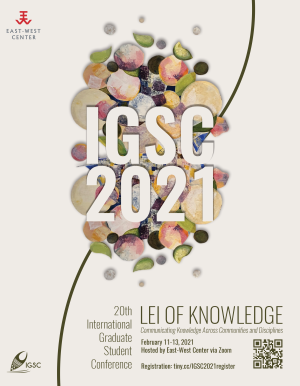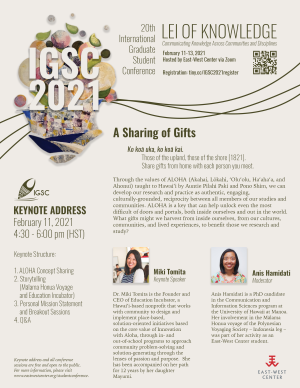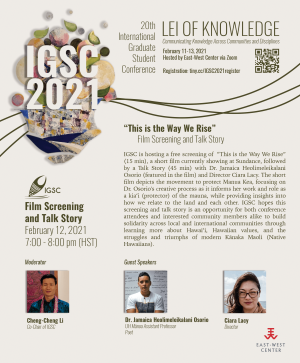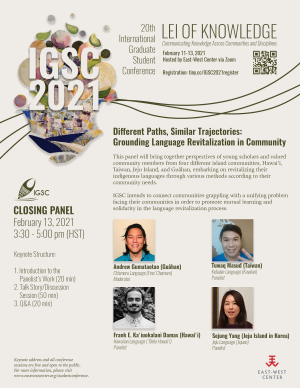Error message
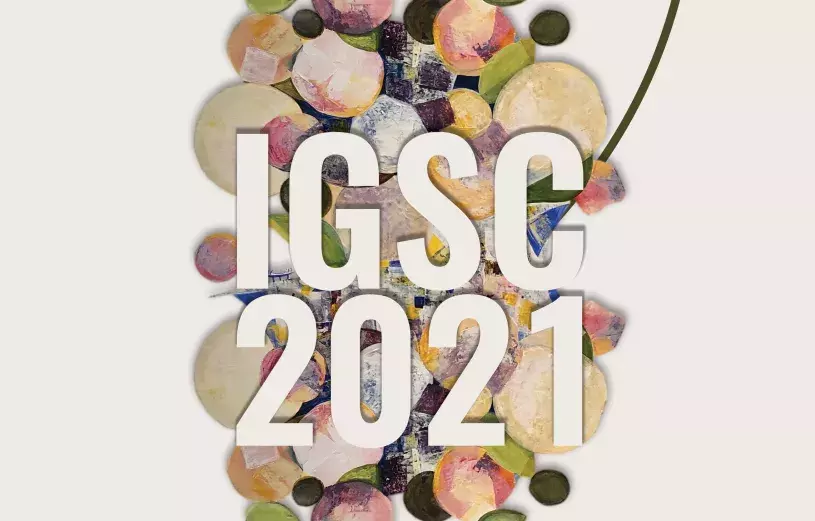
Virtual Conference Dates: February 11-13, 2021
Our conference activities were hosted online this year, utilizing the conference platform Whova, which incorporates real-time program sessions, Zoom group meetings, links to (pre-)recorded video presentations, and various virtual activities for dynamic interactions among registrants. Our virtual conference platform user guide can be accessed here.
Click here for Conference Schedule
The 2021 IGSC program featured a Keynote Address ("A Sharing of Gifts"), a Film Screening & Talk Story ("This is the Way We Rise"), and a Closing Panel ("Different Paths, Similar Trajectories: Grounding Language Revitalization in Community") in addition to various Parallel Sessions from graduate students from 29 different countries all across the globe. 91 presenters covered a wide range of topics from the Environment, Society and Culture, Borders and Migration, Arts and Language, Gender and Sexuality, Global Health and COVID-19, Academia and Education, Politics and Governance, Philosophy. Descriptions of each even
Keynote Address, February 11, 4:30-6pm HST
"A Sharing of Gifts: Ko koā uka, ko koā kai."
Those of the upland, those of the shore [1821].
Share gifts from home with each person you meet.
Through the values of ALOHA (Akahai, Lōkahi, ʻOluʻolu, Haʻahaʻa, and Ahonui) taught to Hawaiʻi by Auntie Pilahi Paki and Pono Shim, we can develop our research and practice as authentic, engaging, culturally-grounded, reciprocity between all members of our studies and communities. ALOHA is a key that can help unlock even the most difficult of doors and portals, both inside ourselves and out in the world. What gifts might we harvest from inside ourselves, from our cultures, communities, and lived experiences, to benefit those we research and study?
Speaker: Miki Tomita, PhD, founder and CEO of Education Incubator, Hawai‘i
Moderator: Hamis Amidati, Malama Honua Voyage, Indonesia leg. Translator and Guide.
Film screening & Talk Story: "This is the Way We Rise", February 12, 7-8pm
IGSC is hosting a free screening of "This is the Way We Rise," a 15 minute documentary being shown at this year's Sundance Film Festival, followed by a 45 minute discussion with Dr. Jamaica Heolimeleikalani Osorio (featured in the film) and director Ciara Lacey. The Short film depicts the movement to protect Mauna Kea, focusing on Dr. Osorio's creative process as it informs her work and role as kia‘i (protector) of the mountain, while providing insights into how we relate to the land and to each other.
Speakers: Dr. Jamaica Heolimeleikalani Osorio and Ciara Lacy
Moderator: Li Cheng-Cheng, Ph.D. Student
Closing Panel, February 13, 3:30-5pm HST
"Different Paths, Similar Trajectories: Grounding Language Revitalization in Community."
This panel will bring together perspectives of young scholars and valued community members from four different island communities (Hawai‘i, Taiwan, Jeju Island, and Guåhan), embarking on revitalizing their indigenous languages through various methods according to their community needs.
Moderator: Andrew Gumataotao (Guåhan)
Panelists: Tuwaq Masud (Taiwan), Frank E Ka‘iuokalani Damas (Hawai‘i), and Sejung Yang (Jeju Island, Korea)
Theme: Lei of Knowledge - Communicating Knowledge Across Communities and Disciplines
This year is the 20th anniversary of the International Graduate Student Conference (IGSC) taking place February 11-13th, 2021, in Honolulu, Hawai‘i, USA. The East-West Center (EWC) is inviting graduate students and young professionals from around the world to submit abstracts relating to the Asia Pacific region. The conference will provide an opportunity to share interdisciplinary or transdisciplinary perspectives formally, through presenting and attending panel presentations, and informally, through networking with scholars and community members across disciplines in the warm and collaborative environment of the EWC.
A long-standing goal of the EWC has been to promote collaborative and mutually-beneficial partnerships between communities and scholars. Much of our research is rooted in the collective knowledge, insight, and years of effort contributed by communities, organizations, and experts across the Asia-Pacific region. Even so, academic findings can often end up limited to scholars and experts, which leads to a greater knowledge gap between researchers and working professionals. Therefore innovative types of communication and partnership are needed to promote research understanding and community interaction.
This year the conference theme is LEI OF KNOWLEDGE: Communicating Knowledge Across Communities and Disciplines. When a lei—a Hawaiian garland or wreath given at important events—is made, it must be shared with others. This relationship between the maker, the lei, and the recipient is similar to how we view research and its connections to the community. The IGSC team strongly believes that the relationship between researchers themselves and the community should be reciprocal and symbiotic. The IGSC therefore invites you to not only share your research but also show how your research can be or is being shared with or used by the communities it pertains to. Our conference focuses on inclusivity and we embrace various forms of presentation including academic talks, PowerPoint, storytelling, performance, demonstration, using a native language, or any other format best suited to share your research. How does your created knowledge transfer to and empower others? Broadly speaking, this conference will provide opportunities for researchers to disseminate their knowledge and promote accessible research, co-learning, and co-development of methods, strategies, goals/objectives, and outputs at different scales from local to global, in the Asia-Pacific region and beyond.
The conference accepts submissions from every field of study from hard science to the arts & humanities that meet this criteria:
- Inclusion of communities in the identification of the research question(s) and their continued involvement in the research
- Co-identification of challenges and informational needs for a community
- Innovative communication and partnership between research and community
- Exchanging of knowledge, experiences, and goals with community stakeholders
- Utilization of multidisciplinary or transdisciplinary methods with respect for diverse knowledge systems and ethics in the research process
- Research that connects to the local community as well as research that scales up to the global community (with community defined broadly as any group of people)
- Effective sharing (communication) of research outcomes so that their utility in decision-making, community empowerment, and policy is optimized
- Focus on the Asia-Pacific region or applicable to communities in this region
Me ka mahalo piha (with a fullness of gratitude),
The 20th IGSC Organizers: Bonnie Fox, Cheng-Cheng Li, Chiao-Wen Chiang, Jenny Ung, Griffin Werner, and Rachael Sook Zhen Wong.
For any inquiries or questions regarding the conference, please connect with us at [email protected].
Logistical Information (FAQs)
The IGSC Frequently Asked Questions page contains comprehensive information for attendees and presenters regarding the conference, including visitor information, conference logistics, and transportation options from the airport to the EWC.
Conference Venue and Accommodation
This year's conference will be hosted fully online. Presenters: please see our guidelines page for more information. Attendee registration will be available in early 2021.
Normally, the conference is held at the Hawaii Imin International Conference Center, at 1777 East-West Road, Honolulu, HI 96848, which adjoins the University of Hawai‘i at Mānoa campus and the East-West Center residence halls. Refer to the Imin Conference Center website for more information.
A limited number of rooms at the East-West Center residence halls are reserved for registered conference participants. Special rates will be made available for conference participants but will be applicable only for the conference dates. (However, once you check out, the special rates will not be applicable if you check in again during the specified period). Make sure that you mention the International Graduate Student Conference when you reserve a room.
The rates per night for the conference participants are as follows:
Hale Manoa & Hale Kuahine
- Single room dorm - $19/night
- Double dorm room - $29/night
Lincoln Hall
- Studio room - $41/night
- Corner Studio room - $54/night
- 1 bedroom w/kitchen room - $65/night
Rent is due upon check in.
The single and double rooms (in Hale Manoa and Hale Kuahine) are dormitory style with shared bathroom/toilet facilities while the studio (in Lincoln Hall) has its own bathroom/toilet facility. Sheets/blankets/pillows are provided in the dormitories, and all of those plus towels are also provided in Lincoln Hall. None of them has air conditioning. Shared kitchen facilities and coin-operated laundry machines are available in Hale Manoa and Hale Kuahine.
Please refer to the EWC Housing website for details (including pictures of the rooms) and reservation procedure.
Participants are requested to get in touch with EWC Housing authorities directly for their accommodation reservation as well as questions thereto by email at: [email protected]. Please wait until you are notified about the results of abstract selection committee before making a reservation. Due to the busy holiday season, please allow up to a week for the EWC Housing Office to respond to inquires.
We look forward to welcoming you to the East-West Center. In preparation of your arrival, please visit our East-West Center Participant Information webpage where you can find useful tips for your stay here.
U.S. Visa Information
Non-US participants who need a B-1 visa to enter the United States are encouraged to start looking for information related to obtaining a US visa in your country. The following websites may be useful for you:
US Embassies
- for embassy location, policies, and procedures for visa applications/issuance
Visa Appointments & Waiting Times
- for wait times for required visa appointments/issuance by consular post
Visa Waiver Program
- for countries participating in a visa waiver program with the United States
Please note that the EWC does not provide visa assistance. However, the abstract acceptance email for the conference serves as a valid document for you to initiate your visa process.
Past Conferences
For additional information, as well as photos, please refer to the web pages for past conferences, available in the right-hand menu.
Contact Information
The International Graduate Student Conference
c/o EWC Education Program
1601 East-West Road, Burns Hall 2089
Honolulu, Hawai‘i 96848
USA
Ph. (808) 944-7458
Fax (808) 944-7070
Email: [email protected]
Travel notice:
The East-West Center is committed to following travel guidelines set out by the CDC regarding the coronavirus. The 2021 conference activities will be hosted fully online this year, utilizing the conference platform Whova. Information for logging into Whova will be provided at a later date. We are excited to plan an integrated conference and networking experience from the comfort of our own homes..
Virtual Conference Dates: February 11-13, 2021
Our conference activities were hosted online this year, utilizing the conference platform Whova, which incorporates real-time program sessions, Zoom group meetings, links to (pre-)recorded video presentations, and various virtual activities for dynamic interactions among registrants. Our virtual conference platform user guide can be accessed here.
Click here for Conference Schedule
The 2021 IGSC program featured a Keynote Address ("A Sharing of Gifts"), a Film Screening & Talk Story ("This is the Way We Rise"), and a Closing Panel ("Different Paths, Similar Trajectories: Grounding Language Revitalization in Community") in addition to various Parallel Sessions from graduate students from 29 different countries all across the globe. 91 presenters covered a wide range of topics from the Environment, Society and Culture, Borders and Migration, Arts and Language, Gender and Sexuality, Global Health and COVID-19, Academia and Education, Politics and Governance, Philosophy. Descriptions of each even
Keynote Address, February 11, 4:30-6pm HST
"A Sharing of Gifts: Ko koā uka, ko koā kai."
Those of the upland, those of the shore [1821].
Share gifts from home with each person you meet.
Through the values of ALOHA (Akahai, Lōkahi, ʻOluʻolu, Haʻahaʻa, and Ahonui) taught to Hawaiʻi by Auntie Pilahi Paki and Pono Shim, we can develop our research and practice as authentic, engaging, culturally-grounded, reciprocity between all members of our studies and communities. ALOHA is a key that can help unlock even the most difficult of doors and portals, both inside ourselves and out in the world. What gifts might we harvest from inside ourselves, from our cultures, communities, and lived experiences, to benefit those we research and study?
Speaker: Miki Tomita, PhD, founder and CEO of Education Incubator, Hawai‘i
Moderator: Hamis Amidati, Malama Honua Voyage, Indonesia leg. Translator and Guide.
Film screening & Talk Story: "This is the Way We Rise", February 12, 7-8pm
IGSC is hosting a free screening of "This is the Way We Rise," a 15 minute documentary being shown at this year's Sundance Film Festival, followed by a 45 minute discussion with Dr. Jamaica Heolimeleikalani Osorio (featured in the film) and director Ciara Lacey. The Short film depicts the movement to protect Mauna Kea, focusing on Dr. Osorio's creative process as it informs her work and role as kia‘i (protector) of the mountain, while providing insights into how we relate to the land and to each other.
Speakers: Dr. Jamaica Heolimeleikalani Osorio and Ciara Lacy
Moderator: Li Cheng-Cheng, Ph.D. Student
Closing Panel, February 13, 3:30-5pm HST
"Different Paths, Similar Trajectories: Grounding Language Revitalization in Community."
This panel will bring together perspectives of young scholars and valued community members from four different island communities (Hawai‘i, Taiwan, Jeju Island, and Guåhan), embarking on revitalizing their indigenous languages through various methods according to their community needs.
Moderator: Andrew Gumataotao (Guåhan)
Panelists: Tuwaq Masud (Taiwan), Frank E Ka‘iuokalani Damas (Hawai‘i), and Sejung Yang (Jeju Island, Korea)
Theme: Lei of Knowledge - Communicating Knowledge Across Communities and Disciplines
This year is the 20th anniversary of the International Graduate Student Conference (IGSC) taking place February 11-13th, 2021, in Honolulu, Hawai‘i, USA. The East-West Center (EWC) is inviting graduate students and young professionals from around the world to submit abstracts relating to the Asia Pacific region. The conference will provide an opportunity to share interdisciplinary or transdisciplinary perspectives formally, through presenting and attending panel presentations, and informally, through networking with scholars and community members across disciplines in the warm and collaborative environment of the EWC.
A long-standing goal of the EWC has been to promote collaborative and mutually-beneficial partnerships between communities and scholars. Much of our research is rooted in the collective knowledge, insight, and years of effort contributed by communities, organizations, and experts across the Asia-Pacific region. Even so, academic findings can often end up limited to scholars and experts, which leads to a greater knowledge gap between researchers and working professionals. Therefore innovative types of communication and partnership are needed to promote research understanding and community interaction.
This year the conference theme is LEI OF KNOWLEDGE: Communicating Knowledge Across Communities and Disciplines. When a lei—a Hawaiian garland or wreath given at important events—is made, it must be shared with others. This relationship between the maker, the lei, and the recipient is similar to how we view research and its connections to the community. The IGSC team strongly believes that the relationship between researchers themselves and the community should be reciprocal and symbiotic. The IGSC therefore invites you to not only share your research but also show how your research can be or is being shared with or used by the communities it pertains to. Our conference focuses on inclusivity and we embrace various forms of presentation including academic talks, PowerPoint, storytelling, performance, demonstration, using a native language, or any other format best suited to share your research. How does your created knowledge transfer to and empower others? Broadly speaking, this conference will provide opportunities for researchers to disseminate their knowledge and promote accessible research, co-learning, and co-development of methods, strategies, goals/objectives, and outputs at different scales from local to global, in the Asia-Pacific region and beyond.
The conference accepts submissions from every field of study from hard science to the arts & humanities that meet this criteria:
- Inclusion of communities in the identification of the research question(s) and their continued involvement in the research
- Co-identification of challenges and informational needs for a community
- Innovative communication and partnership between research and community
- Exchanging of knowledge, experiences, and goals with community stakeholders
- Utilization of multidisciplinary or transdisciplinary methods with respect for diverse knowledge systems and ethics in the research process
- Research that connects to the local community as well as research that scales up to the global community (with community defined broadly as any group of people)
- Effective sharing (communication) of research outcomes so that their utility in decision-making, community empowerment, and policy is optimized
- Focus on the Asia-Pacific region or applicable to communities in this region
Me ka mahalo piha (with a fullness of gratitude),
The 20th IGSC Organizers: Bonnie Fox, Cheng-Cheng Li, Chiao-Wen Chiang, Jenny Ung, Griffin Werner, and Rachael Sook Zhen Wong.
For any inquiries or questions regarding the conference, please connect with us at [email protected].
Logistical Information (FAQs)
The IGSC Frequently Asked Questions page contains comprehensive information for attendees and presenters regarding the conference, including visitor information, conference logistics, and transportation options from the airport to the EWC.
Conference Venue and Accommodation
This year's conference will be hosted fully online. Presenters: please see our guidelines page for more information. Attendee registration will be available in early 2021.
Normally, the conference is held at the Hawaii Imin International Conference Center, at 1777 East-West Road, Honolulu, HI 96848, which adjoins the University of Hawai‘i at Mānoa campus and the East-West Center residence halls. Refer to the Imin Conference Center website for more information.
A limited number of rooms at the East-West Center residence halls are reserved for registered conference participants. Special rates will be made available for conference participants but will be applicable only for the conference dates. (However, once you check out, the special rates will not be applicable if you check in again during the specified period). Make sure that you mention the International Graduate Student Conference when you reserve a room.
The rates per night for the conference participants are as follows:
Hale Manoa & Hale Kuahine
- Single room dorm - $19/night
- Double dorm room - $29/night
Lincoln Hall
- Studio room - $41/night
- Corner Studio room - $54/night
- 1 bedroom w/kitchen room - $65/night
Rent is due upon check in.
The single and double rooms (in Hale Manoa and Hale Kuahine) are dormitory style with shared bathroom/toilet facilities while the studio (in Lincoln Hall) has its own bathroom/toilet facility. Sheets/blankets/pillows are provided in the dormitories, and all of those plus towels are also provided in Lincoln Hall. None of them has air conditioning. Shared kitchen facilities and coin-operated laundry machines are available in Hale Manoa and Hale Kuahine.
Please refer to the EWC Housing website for details (including pictures of the rooms) and reservation procedure.
Participants are requested to get in touch with EWC Housing authorities directly for their accommodation reservation as well as questions thereto by email at: [email protected]. Please wait until you are notified about the results of abstract selection committee before making a reservation. Due to the busy holiday season, please allow up to a week for the EWC Housing Office to respond to inquires.
We look forward to welcoming you to the East-West Center. In preparation of your arrival, please visit our East-West Center Participant Information webpage where you can find useful tips for your stay here.
U.S. Visa Information
Non-US participants who need a B-1 visa to enter the United States are encouraged to start looking for information related to obtaining a US visa in your country. The following websites may be useful for you:
US Embassies
- for embassy location, policies, and procedures for visa applications/issuance
Visa Appointments & Waiting Times
- for wait times for required visa appointments/issuance by consular post
Visa Waiver Program
- for countries participating in a visa waiver program with the United States
Please note that the EWC does not provide visa assistance. However, the abstract acceptance email for the conference serves as a valid document for you to initiate your visa process.
Past Conferences
For additional information, as well as photos, please refer to the web pages for past conferences, available in the right-hand menu.
Contact Information
The International Graduate Student Conference
c/o EWC Education Program
1601 East-West Road, Burns Hall 2089
Honolulu, Hawai‘i 96848
USA
Ph. (808) 944-7458
Fax (808) 944-7070
Email: [email protected]
Travel notice:
The East-West Center is committed to following travel guidelines set out by the CDC regarding the coronavirus. The 2021 conference activities will be hosted fully online this year, utilizing the conference platform Whova. Information for logging into Whova will be provided at a later date. We are excited to plan an integrated conference and networking experience from the comfort of our own homes..


